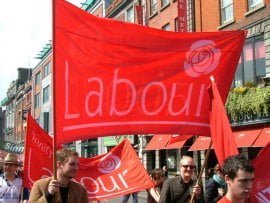Sunday 17th February marked the 2013 AGM of London Young Labour, held in Stratford Town Hall in east London, with 60 young members of the Labour Party in attendance. Socialist Appeal supporters were present, arguing for the need for Young Labour to be a forum for political discussion and debate, whereby working class youth and students can argue for a genuine alternative to crisis austerity.
Sunday 17th February marked the 2013 AGM of London Young Labour, held in Stratford Town Hall in east London, with 60 young members of the Labour Party in attendance. As Socialist Appeal supporters pointed out during the day’s sessions, this is a disappointing turn out given a city of over 8 million people, which includes the largest section of Young Labour in the UK, especially at a time when the young in particular are suffering the effects of the crisis of capitalism, with youth unemployment at 20.5%, EMA cancelled, tuition fees trebled, and many unable to afford to move out of their parents’ homes.
Low turnout was primarily due to the agenda for the AGM, which was focussed almost entirely around elections, with little or no time for discussion on the actual policies that young Labour members would like to see us fighting for. Elections for committee positions are obviously necessary for the democratic functioning of any organisation, however more could be done to attract young people to the event through engaging people in actual political debate about the alternative that Labour should be offering to that of austerity put forward by the Tories and the coalition government.
Following the elections, caucuses were held to elect officers for those who self defined as disabled, LGBT, under 19, BAME, and women, and at the same time ‘training sessions’ were held to learning about being a councillor and about how policy is decided in the Labour Party.
There was a notable lack of any opportunities to actually discuss policy or submit motions at the AGM, despite this being possible under the LYL constitution. In the session on how policy is decided in the party, the lack of actual policy discussion at the AGM was pointed out by a Socialist Appeal supporter from the floor. The regional director of the Labour Party, who had been brought in to chair the session, agreed and allowed a political discussion to develop. The thirst to discuss policy and theory was clearly evidenced by the enthusiastic contributions from the young comrades in attendance, and the event would certainly have attracted a larger attendance had policy and political discussion actually been on the agenda.
Discussion moved on to the undemocratic way in which the party had been re-branded with the ‘One Nation’ label – originally a Tory slogan – and whether such a slogan is actually correct. It was noted that the working class, who the Labour Party was founded to represent, clearly does not and cannot live happily as ‘One Nation’ with the capitalists, landlords, bankers, and bosses. We particularly agreed with the comrade who argued that we should not be trying to capture the Tory vote, but should be standing up for the working class and countering the myth of ‘strivers versus skivers’.
In the session about becoming a councillor, we were informed about the structure of councils, their responsibilities, and how councillors are selected. When the issue of councillors opposing the cuts was raised, with specific reference to the struggle of the Hull councillors, who are being disciplined for doing so, we were told that councillors obeying the whip is necessary “in order to defeat the opposition”. When it was pointed out that councillors being forced to obey the whip are not ‘defeating the opposition’, but are actually helping to carry through the oppositions’ programme of cuts, Val Shawcross, a member of the Greater London Authority, informed us that as a councillor you will be forced to make “tough decisions”, and that if you’re not prepared to do so, you shouldn’t become a councillor!
At the next session, a Q+A with Val, she then informed us that given the terrible economic situation, we must fight the cuts, and that Labour must be there for people. Yes we agree! But this is clearly contradictory to the message she gave only ten minutes earlier about councillors needing to make ‘tough decisions’ to implement the cuts. As we have argued previously, Labour councillors must fight the cuts, but this can only be done on the basis of a mass campaign for socialist policies, involving the trade unions and the Labour Party. By nationalising the banks and big monopolies, and planning production under democratic workers’ control, instead of cuts to jobs and services, we could have full employment and a massive rise in living standards.
The handful of more left wing candidates who stood for committee positions were elected; an encouraging sign of the waning influence of New Labour within LYL. Hazel Nolan won the election for Chair of London Young Labour. Hazel ran on a programme that included “introducing a democratic and transparent LYL policy process… so that the next AGM can pass motions on policy”. We fully support this measure, and look forward to its implementation.
However, we must be clear that democracy and transparency are only a means to an end – a means whereby young people can discuss the problems facing them and fight for an alternative to crisis and austerity. This could help provide the beginnings of transforming LYL into a fighting and campaigning organisation, which is desperately needed if the party is to attract more young members and provide a genuine socialist alternative for working class youth and students today.






